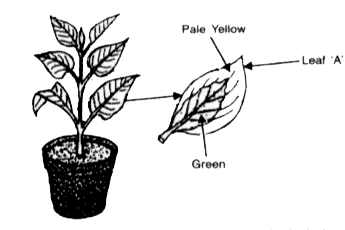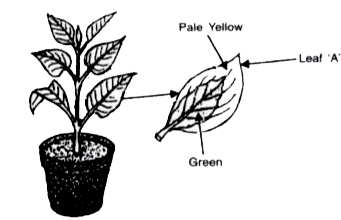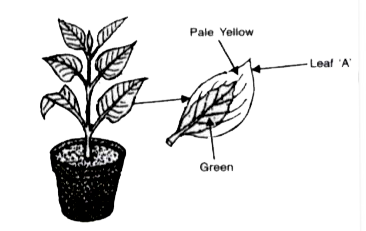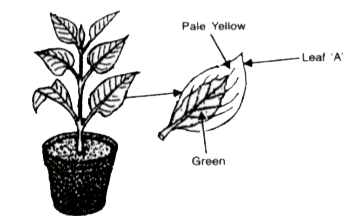Potted plants are not allowed to remain in room of a patient during night as
they concume O2 at night
Produce CO2 at night
They release O2 only during day
they are unable to photosynthesize and deplete O2 of the room at night.
The correct Answer is:D
Step-by-Step Solution:
1. Understanding Photosynthesis:
- Photosynthesis is the process by which green plants convert light energy into chemical energy, using carbon dioxide (CO2) and water (H2O) to produce glucose and oxygen (O2).
2. Role of Stomata:
- Stomata are small openings on the surface of leaves that allow for gas exchange. They open to take in carbon dioxide and release oxygen during the day when there is sufficient light.
3. Day vs. Night Conditions:
- During the day, when light is available, stomata are generally open, allowing for the intake of CO2 and the release of O2.
- At night, in the absence of light, stomata usually close to prevent water loss, and the process of photosynthesis halts.
4. Respiration in Plants:
- At night, plants continue to respire, which means they consume oxygen and release carbon dioxide. This is the opposite of what occurs during photosynthesis.
5. Impact on Patients:
- If potted plants are kept in a patient's room at night, they will consume the available oxygen through respiration. Since patients may already have compromised health, a decrease in oxygen levels can further affect their well-being.
6. Conclusion:
- Therefore, potted plants are not allowed to remain in the room of a patient during the night because they can deplete the oxygen levels, potentially harming the patient's health.
- Photosynthesis is the process by which green plants convert light energy into chemical energy, using carbon dioxide (CO2) and water (H2O) to produce glucose and oxygen (O2).
- Stomata are small openings on the surface of leaves that allow for gas exchange. They open to take in carbon dioxide and release oxygen during the day when there is sufficient light.
- During the day, when light is available, stomata are generally open, allowing for the intake of CO2 and the release of O2.
- At night, in the absence of light, stomata usually close to prevent water loss, and the process of photosynthesis halts.
- At night, plants continue to respire, which means they consume oxygen and release carbon dioxide. This is the opposite of what occurs during photosynthesis.
- If potted plants are kept in a patient's room at night, they will consume the available oxygen through respiration. Since patients may already have compromised health, a decrease in oxygen levels can further affect their well-being.
- Therefore, potted plants are not allowed to remain in the room of a patient during the night because they can deplete the oxygen levels, potentially harming the patient's health.
Topper's Solved these Questions
- PHOTOSYNTHESISBOOK - DINESH PUBLICATION ENGLISHCHAPTER - PHOTOSYNTHESISEXERCISE - CYG
10 Videos
- ORIGIN OF LIFE BOOK - DINESH PUBLICATION ENGLISHCHAPTER - ORIGIN OF LIFE EXERCISE - All Questions
201 Videos
- PHYLUM - ANNELIDABOOK - DINESH PUBLICATION ENGLISHCHAPTER - PHYLUM - ANNELIDAEXERCISE - Check your grasp
10 Videos
Similar Questions
Which tissue remains more active during autumn
View SolutionA block of metal is heated to a temperature much higher than the room temperature and allowed to cool in a room free from air currents. Which of the following curves correctly represents the rate of cooling
View SolutionStomata remain open at night in
View SolutionAll plants give out oxygen during day carbon dioxide during night . Do you agree with this statement ? Give reason
View SolutionIn coastal regions the density of air above sea, during night is:
View SolutionA potted plant with variegated leaves was taken in order to prove a factor necessary for photosynthesis. The potted plant was kept in the dark for 24 hours and then placed in bright sunlight for a few hours Observe the diagrams and answer the questions.

What will be the result of the starch test performed on leaf A shown in the diagram? Give an example of a plant with variegated leaves
View SolutionA potted plant with variegated leaves was taken in order to prove a factor necessary for photosynthesis. The potted plant was kept in the dark for 24 hours and then placed in bright sunlight for a few hours Observe the diagrams and answer the questions.

Why was the plant kept in the dark before beginning the experiment?
View SolutionA potted plant with variegated leaves was taken in order to prove a factor necessary for photosynthesis. The potted plant was kept in the dark for 24 hours and then placed in bright sunlight for a few hours Observe the diagrams and answer the questions.

What aspect of photosynthesis is being tested in the above diagram?
View SolutionA potted plant with variegated leaves was taken in order to prove a factor necessary for photosynthesis. The potted plant was kept in the dark for 24 hours and then placed in bright sunlight for a few hours Observe the diagrams and answer the questions.

Represent the process of photosynthesis in the form of a balanced equation
View SolutionLeaves of a healthy potted plant were coated with vaseline . Will this plant remain healthy for long ? Give reasons for your answer.
View Solution
